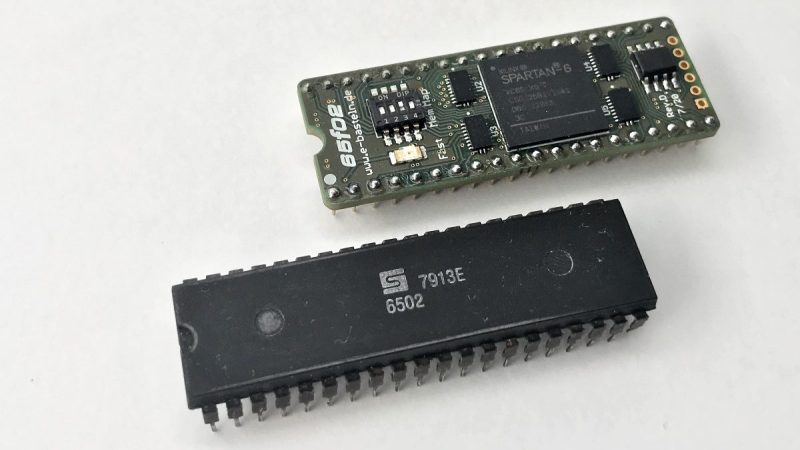Does the in 65F02 “F” stand for “fast” or “FPGA”? [Jurgen] doesn’t know, but his drop-in replacement board for the 6502 and 65c02 is out there and open source, whatever you want it to stand for.
The “f” could easily be both, since at 100 MHz, the 65f02 is blazing fast by 6502 standards–literally 100 times the speed of the first chips from MOS. That speed comes from the use of a Spartan 6 FPGA core to implement the 6502 logic; making the “f” stand for “FPGA” makes sense, given that the CMOS version of the chip was dubbed the 65c02. The 65f02 is a tiny PCB containing the FPGA and all associated hardware that shares the footprint of a DIP-40 package, making it a drop-in replacement. A really fast drop-in replacement.
You might be thinking that that’s insane, and that (for example) the memory on an Apple ][ could never run at 100 MHz and so you won’t get the gains. This is both true, and accounted for: the 65F02 has an internal RAM “cache” that it mirrors to external memory at a rate the bus can handle. When memory addresses known to interact with peripherals change, the 65f02 slows down to match for “real time” operations.

Because of this the memory map of the external machine matters; [Jurgen] has tested the Commodore PET and Apple ][, along with a plethora of German chess computers, but, alas, this chip is not currently compatible with the Commodore 64, Atari 400/800 or BBC Micro (or at least not tested). The project is open source, however, so you might be able to help [Jurgen] change that.
We admit this project isn’t totally new– indeed, it looks like [Jurgen]’s last update was in 2024– but a fast 6502 is just as obsolete today as it was when [Jurgen] started work in 2020. That’s why when [Stephen Walters] sent us the tip (via electronics-lab), we just had to cover it, especially considering the 6502’s golden jubilee.
We also recently featured a 32-bit version of the venerable chip that may be of interest, also on FPGA.
















I am immediately start wondering if I make this a drop in replacement for my project car’s 6502 based ECU. Reading data from the ECU is severely limited by serial bandwidth, this may allow the reading of much more data (memory) without impacting the ECUs ability to do it’s engine control thing.
Lewin covered this in 2021 :)
https://hackaday.com/blog/?s=65f02
But now we have design files and a chance at buying the Spartan6!
Certainly a worthy reason for an update, although it would have definitely been nice to link prior Hackaday coverage in the post itself.
I can’t quite grok this statement. Is there a “not” missing or are you asking to go from open source to closed source?
Now more awake. It is about adding support for the other chips.
I think this could work with the Atari 800/xl/xe series computers if you can run the chip at normal speed and turn off the Atari’s custom co-processors when you accelerate the cpu do your calculations and then return the cpu to a acceptable speed and turn the co-processors back on. Something similar was done in order to allow the normal 65c02 in the Atari to run faster for things like software voice synthesis, rendering graphics and to accommodate faster (14.4 modems).
It might also need to detect spin-loops. These were way too common, and tied software behavior to hardware speed.
The F in 65F02 originally meant Forth, as in it was intended to be a microcontroller with a built-in Forth 83 interpreter baked into ROM.